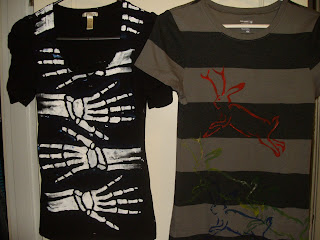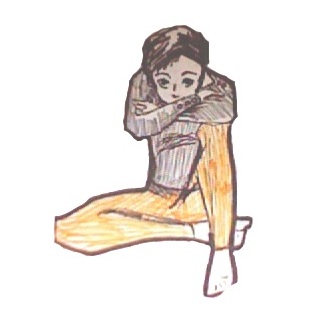
Obesity is a delicate issue. There's a lot to discuss there.*
I'm speaking, admittedly, from outside the affected group–I've never dealt with being obese. Right now, though, I'm trying to lose weight; I was unemployed for about two months and severely depressed, and because of that I've gotten badly out of shape and, combined with the usual lack of motivation to go outside in the winter, a bit chubbier than I'd hope to be. I've put this much weight off before, though, and I know that it takes a healthy diet, exercise and patience. For me the patience is the hardest part; I'm a spontaneous, instant-gratification type, and not being able to lose the 15 pounds that I want to drop in a week is irritating to me. Body dysmorphia is a real and terrible thing, and it affects more people than one would expect. Losing weight is hard because you have to notice yourself every single day, have to feel those jeans being a bit too tight, look down at yourself in the shower and face the demon of it.
There is a serious issue in this country with obesity. According to the Center for Disease Control, one out of every three Americans is obese, and about 17% of children and adolescents are obese. Seventeen percent. In my own state of Oregon, at least 25% of the population is obese. I see it every day at work or in transit. It's an epidemic that affects people emotionally and medically, and the environmental impact is surprising–obesity means less people biking and more driving, more companies that make junk and fast food continuing to stay in business and do things to the environment that are incredibly upsetting. Am I saying that stopping obesity will stop global warming? I wouldn't be so bold. But I would argue that a change in lifestyle that emphasizes health and wellness will lead itself to awareness and action–at least, that's my theory on it.
"Hold up, Meg," you say. "Why are you talking about this? Isn't your blog reserved for tiresome rambling about pop culture that no one but you reads anyway? Why so political and shit?"
Well I'll tell you, buddy. The photos at the top of this post are from a campaign called Strong4Life, a statewide campaign in Georgia focused exclusively on childhood obesity. One of their many catchphrases is "stop sugar-coating it, Georgia." Naturally, the ad has been met with some opposition. Its brilliance can't be ignored, though–remember all those anti-drug PSAs that show people tweaked out in a bathroom, or Rachel Leigh Cook smashing a kitchen with a frying pan to represent how heroin destroys lives? Remember the truth campaign (which is apparently still a thing) aimed at tobacco companies that used body bags in their commercials? Good negative advertising relies on shock value. That's really the only way that it works. How long have we been trying to "raise awareness of childhood obesity"? How has that helped the rate of obesity go down? Is it really helpful when the government itself decides that, instead of investing in healthy options for schoolchildren, simply shrugs and says that frozen pizza sauce is a vegetable?
There's this billboard that I go past every day on the way to work that has a picture of a sad, doe-eyed boy of about two or three. The text says something like "he got off the bottle. Now it's his dad's turn." How is that attack on alcoholism–one that uses a child to make a point–any different than one of Strong4Life's videos that has a kid sitting down with his obviously obese mother and asking her "Why am I fat?"
The answer comes down to this: people are sensitive. The excuses pile up: 1) eating healthy is too expensive. 2) Obesity is hereditary. 3) Body obsession is unhealthy, let kids be who they are, they don't need to be skinny like all those celebrities to be beautiful. 4)The government has no right to tell me what to eat. 5)These ads are promoting a negative stereotype of fat kids, which will only empower bullies and increase low self-esteem among kids who already feel bad about themselves.
To which I reply: is sensitive, but weight isn't simply a cosmetic issue, but a health issue; it isn't about looking good in a bikini, it's about living longer and better.
1) Eating healthy is much less expensive than one would think; according to the USDA, most fruits and vegetables cost less than fifty cents a serving, which is half the price of a small fry at Mickey D's.
2) There is evidence that metabolism and appetite are hereditary; however, there is a serious difference between being unable to be skinny and unable to be average.
3) Yes, there is an unhealthy obsession with appearance in this country, which leads to diseases like anorexia and bulimia, but again, this is about health, not sex appeal, and a media-focused lifestyle is one of the things that got us into the habit of obesity in the first place (think of how much we'd have to do if we didn't have a television upon which to watch skinny celebrities do whatever it is they do to make money and be famous?).
4) Go ahead and support whatever Libertarian values you want about how the gov'ment ain't got no right to tell me what to do, but let's point out that school lunches are a very, very small part of a child's life, that the trend of lunches being high-fat, high-sugar and high-sodium is yet another contributor to obesity, and that the reason pizza sauce was called a vegetable was because there were lobbyists for pizza companies convinced congress to vote that way, which means that the gov'ment is tellin' y'all what to eat (I just assume that you think it's okay as long as it's microwaved and full of high fructose corn syrup).
5) Yes, bullying is a serious problem. Low-self esteem and depression are not to be sniffed at, and there is a line that can be crossed when you call someone "fat." But you can't use bullying as an excuse to coddle. Being obese doesn't mean that you're a bad person, or a lesser citizen, or unworthy, unlovable, unattractive, or stupid. But that does not mean that it's okay to be obese. Just like it's not okay to smoke or drink too much or indulge in addictive and damaging drugs (which, by the way, the gov'ment has no qualm with regulating).
Bullying needs to stop across the board, but so does willful ignorance. As Strong4Life notes, ignoring the problem is what got us into it in the first place. It's the most in-your-face evidence of America's unhealthy addiction to excess instead of moderation and blissful stupidity instead of hard truth. The way that children are being affected is the worst part of this; not only do they have no choice in what their parents feed them, but they are being taught that those choices are good, and their bodies are responding accordingly. Do you know why all those kids in L.A. got sick after trying Michelle Obama's promoted pad thai and quinoa? It wasn't because that food is gross. It's because their bodies have been so acclimatized to sodium and corn syrup and cholesterol that the absence of those things makes them feel sick, even though it's ten times better for them in the end.
The problem with the sensitivity issue, the issue of being susceptible to bullying and eating disorders and body dysmorphia, goes back to what i said about my own issues with losing weight. Again, I'm not comparing myself to being obese, but the things I have to do–eat better, exercise more–are along the same lines as someone trying to lose much more weight. And I have a feeling that the problem goes back to patience. After all, how can a society that values fast food easily accept that they have to shop for healthier options, pay attention to what they buy, and cook it themselves? Living healthy and well isn't easy. And there's no such thing as a quick fix; losing weight takes months and months of constant effort and attention. And it's hard to go at something alone. It was hard for me to quit smoking when I lived and worked with smokers, but when I started to spend more time around non-smokers and other people who'd quit, the change was easy. If there was a community that supported a healthy lifestyle–a community, mind you, not just a few posters in the cafeteria–for everyone, then a shift towards healthier, stronger, more active kids would be much less painful than we think.
I have this theory about addiction. It goes like this: though addiction is a real and dangerous thing, there's also a state where one is addicted to the idea of addiction. If you think that you drink constantly because you're an alcoholic and that nothing short six months in the sanitarium will save you, you'll probably just keep drinking and leaning on that crutch of an idea, since you're beyond the point of just accepting responsibility and cutting down. Being depressed works the same way; it's too easy to say "I'm depressed so nothing can make me not depressed and my behavior is thus acceptable" as opposed to "I'm depressed but I need to be responsible for my actions and help myself, despite how difficult it will probably be." Recovery and responsibility is hard to handle. Wallowing and self-pity is easy, and we are too good at doing things the easy way these days.
So, America, I say get off your ass and eat some fucking quinoa. Break a sweat because you have to. Deal with not having the satisfying high of sugar and fats because it'll kill you. And stop being hard on organizations like Strong4Life that are trying to help, not trying to put down fat kids.
*Pun intended? Yeah, sometimes I'm a terrible person.




















.jpeg)






